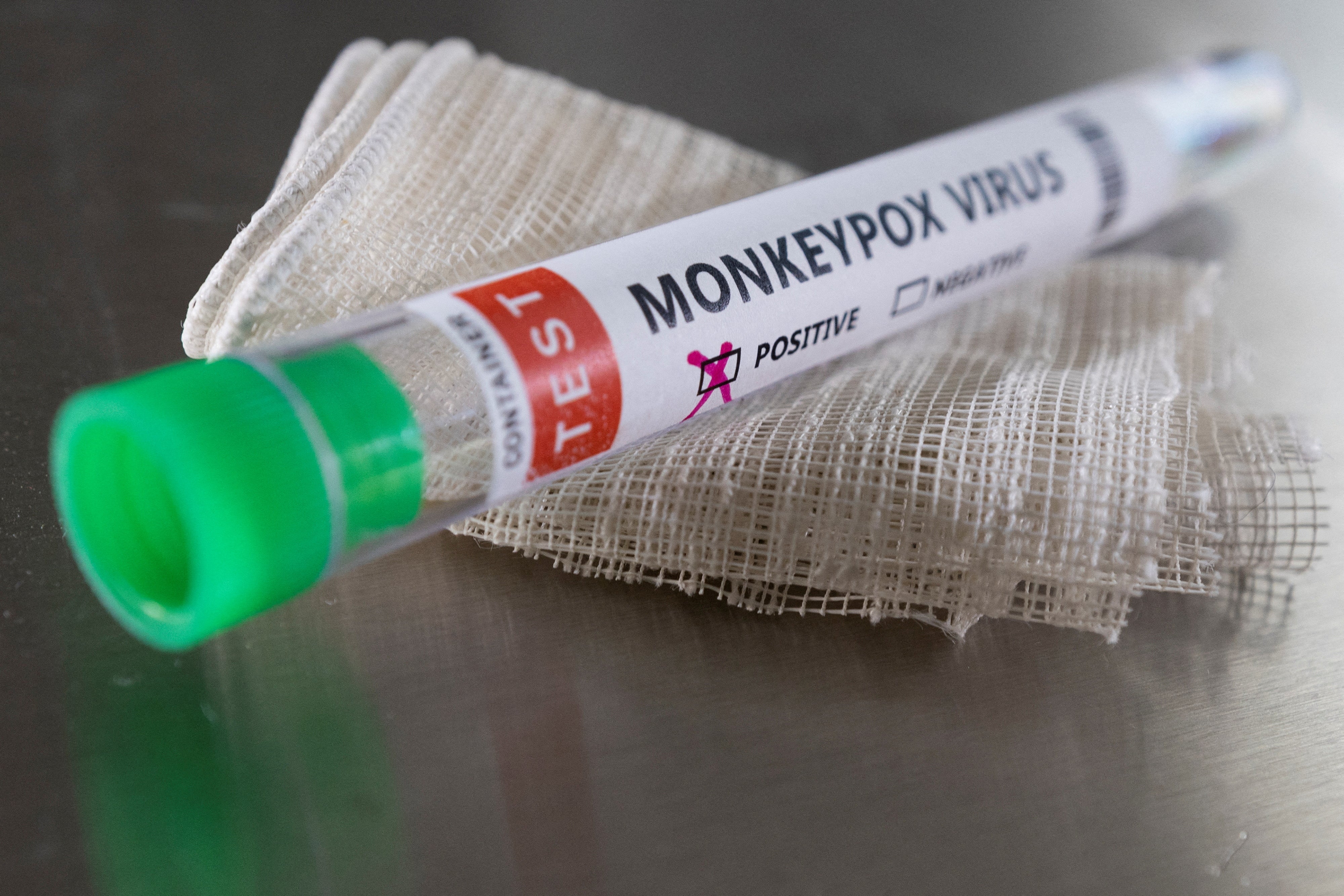Is your monkeypox panic homophobic? It just might be
Calls to close bathhouses, saunas and clubs feel uncomfortable. And though it’s true we need to act sooner and learn lesson from the AIDS crisis, there’s a way to protect men who have sex with men without resorting to anti-gay sentiment or erroneously labeling monkeypox a ‘gay disease’


Your support helps us to tell the story
From reproductive rights to climate change to Big Tech, The Independent is on the ground when the story is developing. Whether it's investigating the financials of Elon Musk's pro-Trump PAC or producing our latest documentary, 'The A Word', which shines a light on the American women fighting for reproductive rights, we know how important it is to parse out the facts from the messaging.
At such a critical moment in US history, we need reporters on the ground. Your donation allows us to keep sending journalists to speak to both sides of the story.
The Independent is trusted by Americans across the entire political spectrum. And unlike many other quality news outlets, we choose not to lock Americans out of our reporting and analysis with paywalls. We believe quality journalism should be available to everyone, paid for by those who can afford it.
Your support makes all the difference.Facts are knowledge and knowledge is power, and history tells us that when gay men start being scapegoated as vectors of disease, that power is important. We saw it happen in the early 1980s, when the little-understood “gay-related immune deficiency” received scant resources or research. That is, until society realized straight people were dying too and the disease was renamed AIDS. So, I’m going to begin by giving you some facts.
Monkeypox is not AIDS. It is here, though, and it is something we should pay attention to. Nearly 400 cases of monkeypox have been reported outside of the disease’s usual area of spread, with 190 of those in the UK. As of this writing, 18 cases have been reported in the United States, according to the Centers for Disease Control and Prevention.
Many of those diagnosed outside of endemic countries have been men who have sex with men, though anyone can catch monkeypox and it may be that these men are simply more proactive about their sexual health — but monkeypox is not a sexually transmitted infection. “Monkeypox is transmitted through large respiratory droplets via prolonged face-to-face contact, contact with bodily fluids, or contaminated objects or surfaces,” Suha Ballout and Omar Fattal of the Lebanese Medical Association for Sexual Health wrote for Al Jazeera.
There have been no reported deaths in non-endemic countries, and most cases seem to be of the less serious West African clade, which according to the UK government has a 1 percent mortality rate compared to a 10 percent mortality rate for the more serious Central African clade. “This is a containable situation,” the World Health Organization’s Maria Van Kerkhove said earlier this week. “It will be difficult, but it’s a containable situation in the non-endemic countries.”
Jim Down, a gay historian of infectious diseases, writes for The Atlantic that while the US “is still dealing with the baggage of the HIV/AIDS crisis” — including the homophobia at its heart — “I worry that public-health leaders are not doing enough to directly alert men who have sex with men about monkeypox.” He goes on to state how important those spaces have been to the development of a gay identity, and how the closure of saunas and bathhouses in the early days of the AIDS epidemic was met with resentment and anger. “I am not suggesting that governments impose restrictions on queer spaces,” he cautions, though he believes that “health agencies ought to tell gay men that monkeypox may indeed be spreading sexually.”
I am inclined to agree with the learned professor. Right now, monkeypox does not warrant the closure of any spaces. This “is a pox virus that we know a lot about,” according to Dr. Stuart Isaacs, an infectious disease expert from the University of Pennsylvania’s Perelman School of Medicine. “We have vaccines, and we even have therapeutics.” That is a key difference between monkeypox and AIDS or even Covid, neither of which we had a good understanding of when they first began spreading.
This is why I reacted with frustration when I saw the LGB Alliance, a British group most known for its opposition to modern transgender activism, this week release a statement calling for “all commercial sex venues, such as saunas, leather/fetish bars and clubs with dark rooms to be closed for a month.” It flies in the face of not only public health recommendations from actual infectious disease experts — who are cautioning calm and encouraging educational campaigns in the very venues the group seeks to close — and further stigmatizes gay and bisexual men at a time when, across the world, our rights are under assault.
I agree with Down, Isaacs, and the LGB Alliance that gay and bisexual men should be made aware of the fact that monkeypox seems to be spreading in our community faster than it is in the population at large. Though we don’t know why that is, it is vital that those in a vulnerable community are made aware and that they are encouraged to proactively protect themselves and others. The UK government is advising people avoid sex while symptomatic and to wear condoms for eight weeks after infection — both sensible precautions that I, personally, might extend to everyone; generally speaking, wearing a condom is best practice, and abstinence is the only surefire way to prevent an STI.
However, I understand that not everybody is going to abide by my moral code nor are they going to always make decisions I agree with. Closing the bathhouses will not make them make different choices, but rather push them to make those choices in different venues — cottaging and cruising in parks, for instance. Better then, surely, to use the bathhouses as an opportunity to educate a vulnerable group about the risks and how they can protect themselves.
We have seen what happens when a new disease emerges, and its spread is blamed on the gays. Noting that anyone can catch monkeypox, Dr. Andrew Lee, a professor of public health at the University of Sheffield, told Reuters that “to label it as a gay disease is both untrue and unfair.” Yet the targeting of bathhouses for closure sends the message that this is an exclusively gay disease, and it reinforces the homophobic trope that gay men are vectors of disease.
That is an especially dangerous development at this juncture. The Washington Post reported that 166 different anti-LGBTQ bills were introduced in state legislatures this year, including Florida’s own version of Section 28 (the infamous “Don’t Say Gay” law) which made a high school valedictorian have to speak in code just to acknowledge his sexuality and the homophobia he encountered.
The LGB Alliance is British, so perhaps they don’t care about what happens in America. Of course, they have an American affiliate (LGB Alliance USA) and the internet is global, meaning their calls will reach across the Atlantic just as quickly as they reach across Soho. It is naïve to think that what they say doesn’t carry weight outside of the UK, especially given the organization’s ties to the American right. Their words play into the hands of those who would actively seek to oppress the very people the LGB Alliance claims to want to help.
Even that I could possibly forgive if they spoke the truth or had a point. They do not. All of the science, and the near-universal consensus of experts, is that monkeypox is not something to panic about. It is certainly not something to close legal businesses for, even legal businesses that cater to men wanting to have sex with other men. Unlike AIDS and Covid, we know a lot about monkeypox, including how to prevent and treat it. And we know that it is relatively mild and usually non-fatal.
If you’re a gay or bisexual man reading this, by all means take precautions. You should anyway, but especially now. We must be vigilant and continue to monitor the spread of monkeypox.
We shouldn’t create needless panic, though. Nor should we stoke the flames of prejudice by resurrecting discredited and stigmatizing tropes about gay men and disease.
Join our commenting forum
Join thought-provoking conversations, follow other Independent readers and see their replies
Comments